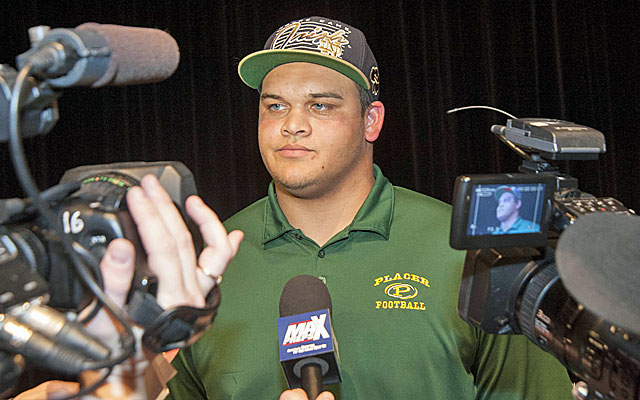
On February 6, 2013, Eddie Vanderdoes, a five-star defensive tackle from Auburn, Calif., signed a National Letter of Intent to attend the University of Notre Dame. Recently, Vanderdoes experienced a change of heart and decided he wanted to attend UCLA, a school closer to home. While under no obligation to release Vanderdoes from his commitment, Notre Dame ultimately chose to release Vanderdoes from the National Letter of Intent recruiting ban, but not release him from rest of the National Letter of Intent provisions. This allowed Vanderdoes to be recruited by and sign with UCLA, but still be subject to the basic penalty since he was not granted his full release (an institution's ability to contact a prospective student-athlete is tied to receiving athletics aid while a prospective student-athlete's eligibility is tied to the National Letter of Intent). The purpose of this article is to explore the options Vanderdoes, or any other National Letter of Intent signee would have if they desire to be released from his or her agreement.
Background: The National Letter of Intent (hereinafter “NLI”) is a binding agreement between a prospective student-athlete and an NLI member institution. When this agreement is signed by the respective parties, there is an agreement for a prospective student-athlete to attend an institution full-time for one academic year in exchange for the institution agreeing to provide athletics financial aid for one academic year (two semesters or three quarters). The NLI is a voluntary program with regard to both institutions and student-athletes. No prospective student-athlete or parent is required to sign the NLI, and no institution is required to join the program.
Penalties for Non-Fulfillment: If a prospective student-athlete does not attend the signing institution or attends that institution for less than one full academic year, and enrolls at another NLI institution, he or she may not represent the second institution in intercollegiate athletics competition until completing one academic year in residence at the second NLI member institution. Additionally, the prospective student-athlete will lose one season of competition in all sports. While serving the NLI penalty, the prospective student-athlete is permitted to practice and receive athletics aid, if allowed by the institution. This penalty is specifically addressed in the NLI agreement the prospective student-athlete and the institution sign. If a prospective student-athlete fails to enroll at the signing institution, he or she has not fulfilled the NLI agreement to attend the signing institution for one academic year. The NLI would remain binding.
Release Process: In order for a prospective student-athlete to be released from an NLI, the prospective student-athlete must submit the NLI Release Request Form (“Release Request Form”) to the signing institution and the NLI office.
The release instructions for a prospective student-athlete can be found here. The website will feature a dropdown list for the prospective student-athlete to choose from regarding the reason for the release and an additional comment box for necessary details.
The Release Request Form can be found here. The submitted Form will be automatically sent to the institution’s director of athletics and designated compliance administrator. The prospective student-athlete will also receive a confirmation e-mail that the Release Request Form has been submitted.
Once the Form is submitted, the institution has 30 days to submit a response. The institution can make one of three decisions: (1) a complete release; (2) no release; or (3) no release with the recruiting ban removed (by removing the NLI Recruiting Ban, contact with coaches is permissible without granting a Complete Release. The NLI Recruiting Ban does not need to be checked on the Release Request Form if granting a complete release). Once the institution submits the release request back to the prospective student-athlete and the NLI office, the NLI office will update the release status visible to member institutions on the NCAA Eligibility Center member institution portal. If a complete release is granted by the institution, the release form and/or the release status on the portal is the confirmation needed for another institution that may have an interest in that prospective student-athlete.
Should the deadline expire with no response from the institution, the prospective student-athlete will be released from the NLI agreement by the NLI office; however, this is not an automatic complete release. The institution will be contacted by the NLI office before any action to determine why the institution did not respond. If circumstances exist preventing the institution to respond within the designated timeframe, an extension may be requested to the NLI office.
Appeals Process: If an institution does not release a prospective student-athlete from his or her NLI obligation, the prospective student-athlete may appeal the decision within 30 days of the institution's "No Release" by filing an appeal with the NLI Policy and Review Committee (hereinafter “NLI Committee). The appeals are sent to the NLI office and should include the NLI Appeals Form (hereinafter “Appeals Form”), a copy of the Release Request Form and any supporting materials. Once a prospective student-athlete’s appeal is received at the NLI office, the signing institution will be notified and will have the opportunity to provide its facts related to the no release decision. Prospective student-athletes will be notified in writing regarding the committee's decision on their appeal. The appeal process can take approximately six to eight weeks.
The appeals process instructions can be found here.
The Appeals Form can be found here.
Appeals decisions of the Committee may be appealed for a second appeal opportunity to the Division I NLI Appeals Committee. This appeal must be made within 30 days of the date of the NLI Committee’s “No Release” decision (refer to the date of the letter sent from the NLI office). The appeals decisions are final and binding.
An institution does not have the right to appeal the NLI Committee’s decision. Furthermore, as a condition of membership in the NLI program, participating institutions and conferences are precluded from bringing legal action against the NLI program or the Collegiate Commissioners Association.

